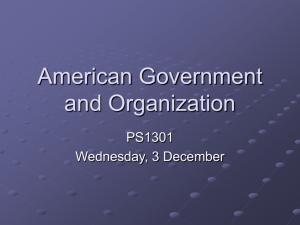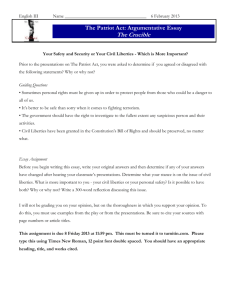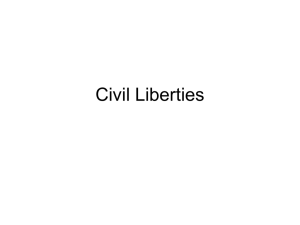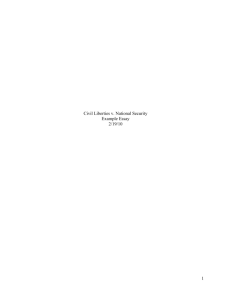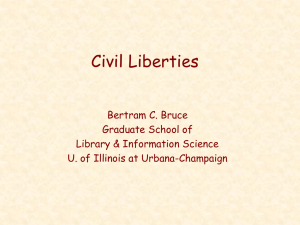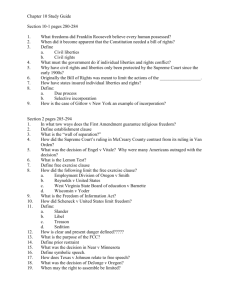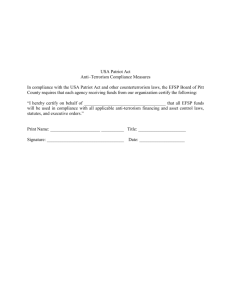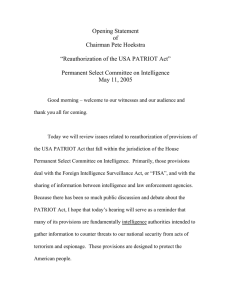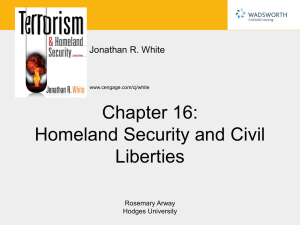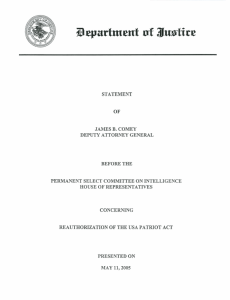War on Terrorism
advertisement
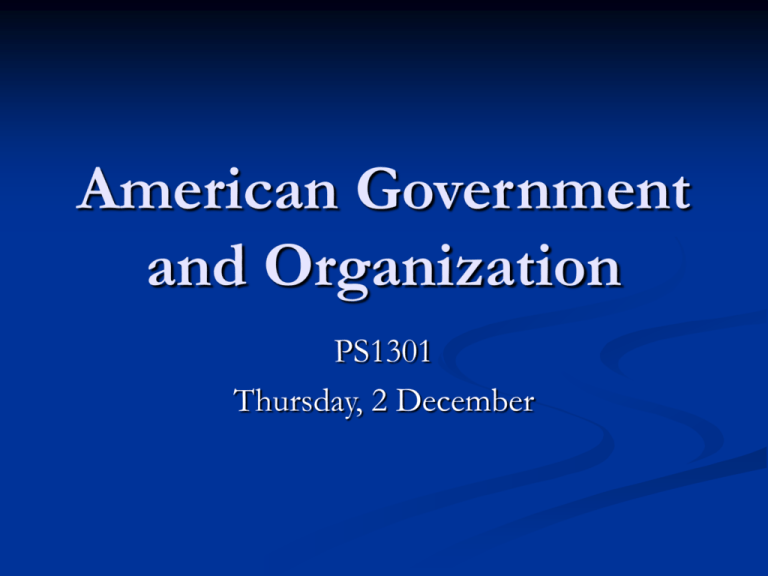
American Government and Organization PS1301 Thursday, 2 December Announcements Teaching evaluations Last meeting next Tuesday. Will provide a review sheet and attendance will be posted on the web. Public Opinion on Restricting Civil Liberties in the Fight Against Terror Do you think it is necessary to give up some civil liberties in order to make the country safe from terrorism, or do you think some of the government’s proposals will go too far in restricting the public’s civil liberties? Necessary to give up some civil liberties 49% Government will go too far 38% Don’t know 13% Source Los Angeles Times Poll Aug 22-25, 2002 Public Opinion on National Identity Cards Would you favor or oppose the following measures to curb terrorism: Requiring all citizens to carry a national identity card to show to a police officer on request? Mid September 2002 Mid August 2002 70% in favor 58% in favor Source: Pew Research Center Aug 14-25, 2002. CBS News/New York Times Poll. Nov. 20-24, 2002. N=996 adults nationwide. MoE ± 3 (total sample). . "Which concerns you more right now -- that the government will fail to enact strong anti-terrorism laws, or that the government will enact new anti-terrorism laws which excessively restrict the average person's civil liberties?" ALL Republicans Democrats Independents % % % % Fail to enact strong laws 40 53 29 40 Excessively restrict liberties 44 29 59 43 Both (vol.) 2 3 1 2 Neither (vol.) 3 5 1 3 Don't know 11 10 10 12 . Policy Responses to 9/11 National Security Economic Joint resolution on 14 Sept. ‘to use all necessary and appropriate force against nations…that he determines planned…the terrorist attacks” Patriot Act (October 2001) Creation of Office of Homeland Security (OHS) Airline relief bill (October 2001) Military Response Invasion of Afghanistan War in Iraq Office of Homeland Security Modeled after the National Security Council which was created at the end of WW II. Responsible for advising the president. Advisor does not have authority to tell federal agencies what to do or how much to spend. Criticisms of OHS Not a cabinet level department; lacks statutory mandate, Senate confirmation, and budget authority Impossible to coordinate different cabinet agencies, ie. CIA, FBI, INS, DEA, FEMA, etc. Effective integration is not guaranteed Patriot Act Summary Enhances executive branch’s power to conduct surveillance, search for money laundering, share intelligence with criminal prosecutors and charge/detain suspected terrorists with crimes. Patriot Act Provisions Relaxes restrictions on information sharing between U.S. law enforcement and intelligence officers about suspected terrorists. Makes it illegal to knowingly harbor a terrorist Authorizes "roving wiretaps," Allows the federal government to detain non-U.S. citizens suspected of terrorism for up to seven days without specific charges. Allows law enforcement officials greater subpoena power for e-mail records of terrorist suspects. Triples the number of Border Patrol, Customs Service Inspectors and Immigration and Naturalization Service inspectors Expands measures against money laundering Eliminates the statute of limitations for prosecuting the most egregious terrorist acts Patriot Act – Threat to Civil Liberties Change in protections from unreasonable search and seizure Detention of non-citizens, immigrants Racial profiling Video Weighing the Patriot Act: Background Weighing the Patriot Act: Discussion The Newshour with Jim Lehrer [PBS] August 19, 2003 SC hears case on “Enemy Combatants” Hamdi v. Rumsfeld and Rumsfeld v. Padilla (2004) The key figures in the cases are both American citizens: Yaser Hamdi is a U.S.-born Saudi-American who was captured during fighting in Afghanistan in 2001 and Jose Padilla is a former Chicago gang member who traveled to Afghanistan and Pakistan before being arrested at a Chicago airport in 2002 on suspicion of plotting to detonate a radioactive "dirty bomb" in the United States. At issue is Habeas Corpus: an individual’s right not to be imprisoned unless charged with a crime, except in time of “rebellion or invasion” Newshour Analysis. The 9/11 Commission Bi-partisan panel forms the National Commission on Terrorist Attacks Upon the United States Where the attacks preventable? Rice testifies before the 9/11 Commission Final Report Recommendations Primary recommendations focused on centralizing intelligence Creation of a new intelligence center and a director, reporting directly to the president, who would have authority over all intelligence groups, including the CIA and the FBI Joint Congressional Committee for Intelligence for Legislative Oversight Other policy options not adopted or abandoned: TIPS – Terror Information and Prevention System (govt./private sector workers ‘spies’). A hotline and web-based reporting system using “those who work in the trucking, maritime, shipping and mass transit industries.” Terror Futures Market Traders could buy and sell futures contracts based on their predictions about what would happen in the region. Racial profiling at airports Total Information Awareness (TIA) One giant database containing all information the government can gather from existing government and private sector data banks. Use sophisticated data mining to detect patterns indicating terrorist activity.
